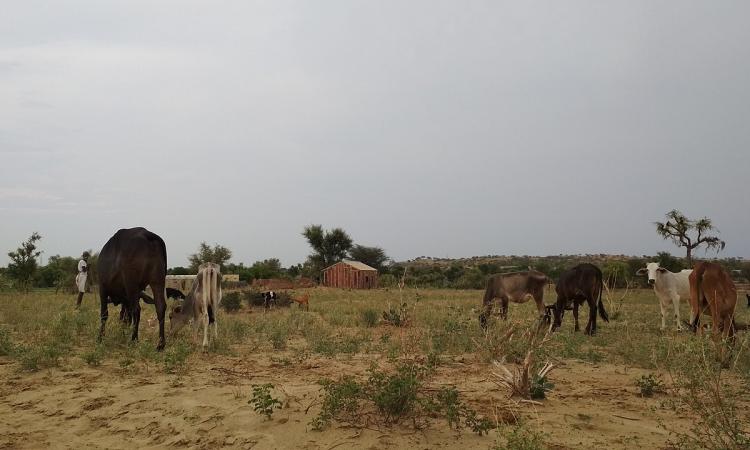
Residents of Boojh village in Rajasthan overcome fodder crisis by reviving their pasture lands.
Residents from Boojh village in Udaipur district of Rajasthan depended on fodder to feed their livestock that supported their livelihoods for generations, but fodder availability continued to decline due to population growth and fragmentation of landholdings. By the 2010s, the situation became so dire that people had to buy fodder from a private beed (pasture) some 7 kilometres away with the price of the beed depending n the owner's whim.
In 2016, Boojh residents got in touch with the Foundation for Ecological Security (FES), a non-profit that works with communities across the country on ecological restoration. FES researchers advised them to overcome fodder crisis by reviving and managing the shamlat or village common land.
Following this, all the households in the village came together to set up a “pasture development and management committee” and decided to revive a 15 hectare pasture they shared with neighbouring villages.
The committee fenced the patch and planted 2,500 saplings of local tree species such as neem, amla, khejri and mahua as well as various perennial native grass species. They then built loose boulder check dams to harvest rainwater and ensure that the hilly terrain retained moisture. As a result the whole area was filled with 1-1.5 metre tall grasses within two years.
The committee decided to allow harvesting of the fodder grass, but only one person from each household was given permission, to prevent overharvesting. A fine of Rs 1,000 was imposed on those who let their cattle wander into the revived pasture and Rs 500 for chopping trees. The committee collects a fee of Rs 20 from each family, which is then spent on the maintenance of the pasture.
Following the success of this initiative, the residents of Boojh in 2019 initiated the development of another pasture, spanning 16 ha. Every family in Boojh now harvests 90-100 bundles (200-250 kilogram) of fodder and the the pastures have helped each family save Rs 1,000 a year (DownToEarth)
A Himalayan village leads the way in the renewable energy drive
Frequently battered by strong winds and landslides, Hengbung village in Manipur located at the foothills of the Himalayas was used to frequent power cuts. However, the challenging terrain of the village is now proving a boon for the village to ensure reliable electricity for the community.
A pumped storage hydropower system fitted with solar powered pumps was installed and has started operating in the village. It is built on a stream and has two interconnected reservoirs that work as a giant water battery which stores renewable power for release during grid outages or when demand is higher.
Atleast 350 households in the village now have constant lighting in their homes and streets and this has changed the lives of villagers by keeping the environment clean while illuminating their homes.
Pumped hydrostorage projects (PSP) have been hailed as a key solution and India's power ministry has recently published draft guidelines to promote this technology. There are currently eight operational PSPs in India with 4.7 GW capacity, most drawing their operating power from the national grid (Economic Times)
Women run farmer producer organisations (FPOs) in Rajasthan set an example for others to follow
Farmer producer organisations (FPOs) formed in Rajasthan by bringing together many women self-help groups (SHGs) are proving to be highly successful. Many women’s SHGs were formed in the state through Rajasthan Grameen Aajeevika Vikas Parishad (Rajeevika) to empower rural women. All the 35 FPOs had been constituted as allotted by the Government of India in 2022-23.
FPOs formed by Rajeevika have greatly helped by adding value to agricultural products such as apple custard pulp, nutritious soybean ladoos, cattle feed, honey and mustard oil. An example of a successful FPO is the Jhalawari Mahila Kisan Producer Company in Jhalawar, women’s FPO, which is producing and marketing honey. The number of women members is around 700. This FPO was started with a share capital of around Rs 19 lakh and the government provided an equity grant of Rs 10 lakh, whereas Rs 6 lakh per annum has been kept for the management of the FPO. The honey produced by this FPO is marketed in the name of ‘Madhusakhi Jhalawari Honey’.
Similarly, Badi Sadri Mahila Kisan Producer Company — Badi Sadri in Chittorgarh district — is a company that has 666 women members and the main work is to produce and market kachchi ghani mustard oil. Looking at the success of these FPOs, the central government has set a target to form 30 additional women’s FPOs in the state (Business Standard).
Digital technology helps Indian farmers maximise their profits
KissanGPT is a powerful AI chatbot that has been launched to bridge the information gap between farmers and experts, providing farmers with the knowledge and resources they need to improve the quality and quantity of produce in their fields. It is designed to help farmers with their agricultural queries, providing real-time advice on crop cultivation, pest control, soil management, irrigation and other farming related topics.
With its user-friendly interface and multilingual support, KissanGPT is proving to be a valuable resource for farmers across India, helping them to overcome the challenges of farming and has been touted as a game-changer for farmers who rely solely on farming for their livelihood.
It is very easy to use and farmers can interact with the chatbot via their smartphones, making it an easily accessible and convenient tool for them to use. KissanGPT has already received positive feedback from farmers who have used it, with many saying that it has helped them to make better decisions about their crops and improve their yields (Business Insider).
This is a roundup of important news updates from April 1 - April 15, 2023. Please view our Policy updates this fortnight here
/articles/residents-boojh-village-rajasthan-come-together-revive-their-pasturelands